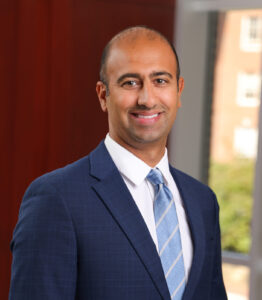 Saif Khairat uses data science to improve healthcare delivery, access, and outcomes through two projects. One seeks to improve physician and nurse electronic health record (EHR) access and use, while the other seeks to understand and address geographic access disparities. In their EHR project, Khairat and his team noted high user dissatisfaction and burnout when using EHR systems. This observation presents a real concern, as these issues increase the risk of medical errors. The team used eye-tracking technology, observation, surveys, and interviews to assist observations. Combining these studies with vendor audit logs, the team can also gain insight into where users spend the greatest amount of time, how they use EHRs, and where they struggle, which can provide valuable information about training and redesign needs. Additionally, they are able to measure fatigue by tracking pupil restrictions. Altogether, this data is being used to redesign systems so physicians and nurses can more intuitively gain essential information about their patients without excessive fatigue, leading to faster and safer health care for individuals.
Khairat’s team is also working to understand health care access disparities throughout North Carolina. They combine data from the US Census Bureau, Center for Disease Control, NCTRACS, and Sheps Center in ArcGIS, creating a multi-layer map that provides insights into the scope of disparities. Studying this map allowed the team to understand how social components such as poverty, race, and age relate to distance from trauma centers and main highways, as well as access to broadband internet and a vehicle. All of these factors impact an individual’s access to medical care. They found that Charlotte and the Raleigh/Durham/Chapel Hill area were the only locations without significant access gaps. By understanding and mapping these disparities, Khairat’s team hopes to help UNC leadership and North Carolina policymakers and leaders think about the vulnerabilities and begin planning ways to improve healthcare access through virtual care and phone visits.
Saif Khairat uses data science to improve healthcare delivery, access, and outcomes through two projects. One seeks to improve physician and nurse electronic health record (EHR) access and use, while the other seeks to understand and address geographic access disparities. In their EHR project, Khairat and his team noted high user dissatisfaction and burnout when using EHR systems. This observation presents a real concern, as these issues increase the risk of medical errors. The team used eye-tracking technology, observation, surveys, and interviews to assist observations. Combining these studies with vendor audit logs, the team can also gain insight into where users spend the greatest amount of time, how they use EHRs, and where they struggle, which can provide valuable information about training and redesign needs. Additionally, they are able to measure fatigue by tracking pupil restrictions. Altogether, this data is being used to redesign systems so physicians and nurses can more intuitively gain essential information about their patients without excessive fatigue, leading to faster and safer health care for individuals.
Khairat’s team is also working to understand health care access disparities throughout North Carolina. They combine data from the US Census Bureau, Center for Disease Control, NCTRACS, and Sheps Center in ArcGIS, creating a multi-layer map that provides insights into the scope of disparities. Studying this map allowed the team to understand how social components such as poverty, race, and age relate to distance from trauma centers and main highways, as well as access to broadband internet and a vehicle. All of these factors impact an individual’s access to medical care. They found that Charlotte and the Raleigh/Durham/Chapel Hill area were the only locations without significant access gaps. By understanding and mapping these disparities, Khairat’s team hopes to help UNC leadership and North Carolina policymakers and leaders think about the vulnerabilities and begin planning ways to improve healthcare access through virtual care and phone visits.
Saif Khairat, Associate Professor and Beerstecher-Blackwell Distinguished Term Scholar
Department: School of Nursing | Faculty Profile
Featured on: January 26, 2023 (Event Page)
Session Title: Advancing Education, Training, and Care (Event Recap)
Tools, Information, and Resources:
- Tobii: Tobii is on a mission to improve the world with our eye tracking and attention computing technology that understands human attention and intent.
- The R Project for Statistical Computing: R is a free software environment for statistical computing and graphics. It compiles and runs on a wide variety of UNIX platforms, Windows and MacOS.
- Tableau: Tableau helps people see and understand data. Our visual analytics platform is transforming the way people use data to solve problems.
- ArcGIS: Connect people, locations, and data using interactive maps. Work with smart, data-driven styles and intuitive analysis tools. Share your insights with the world or specific groups.
- Python: Python is a programming language that lets you work quickly and integrate systems more effectively.